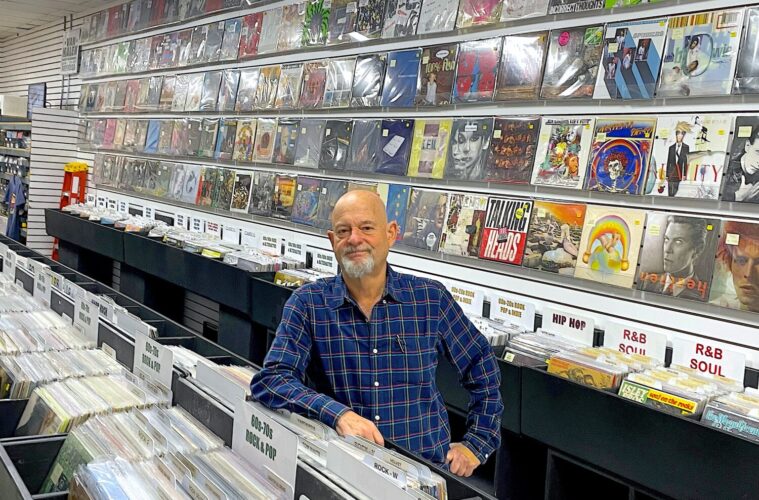Rock, Rock, Rockaway…
Everybody has a few recollections about how they first came to connect with and own tangible music. Beyond old-timers who paid a penny for eight albums through Columbia House mailings, or parents/siblings passing along their dusty classic rock collections, it all comes down to the local record shop.
As a kid of the ‘70s and ‘80s, our first foray consisted of K-Tel disco and mellow gold compilations we saw advertised on TV. Collecting comps and “45s” as we called them (now referred to as singles or seven inches) became a semi-passionate pastime even though our first turntable was basically a plastic toy-like box with a needle. Spinning singles like Lipps Inc’s “Funkytown” and The B-52’s “Rock Lobster,” over and over again, the player was abandoned when it broke and we moved onto a boombox. But even as we started recording off the radio and making mixtapes, buying the hot new album by our favorite artist was exciting – on vinyl, cassettes and later, CDs. We always saved up before a trip to the record store, especially Sunset Strip’s Tower Records (first bought album was fittingly, DEVO’s Freedom of Choice). Though long gone, Tower remains a nostalgic reference point for L.A. music lovers of a certain age – what it looked like, what it felt like to be there, and what it meant to our musical identities. Driving past its new guise as Supreme, the ultra-trendy streetwear emporium, is disconcerting to say the least.
Rockaway Records in Silver Lake (est. 1979) is the other pivotal place that brings back joyful music memories. A true example of music merch’s longevity, it is still going strong, after selling records and collectables in Los Angeles for more than four decades and counting. Seeing its bright yellow and black sign still aglow in the hills, even as its surroundings have changed so much, is heartening. Beyond Tower and mall shops of yore like Music Plus, The Warehouse or Sam Goody, today’s independent record stores remain formative for a new generation and essential for elder musicheads – even with Spotify and Apple Music’s current domination.
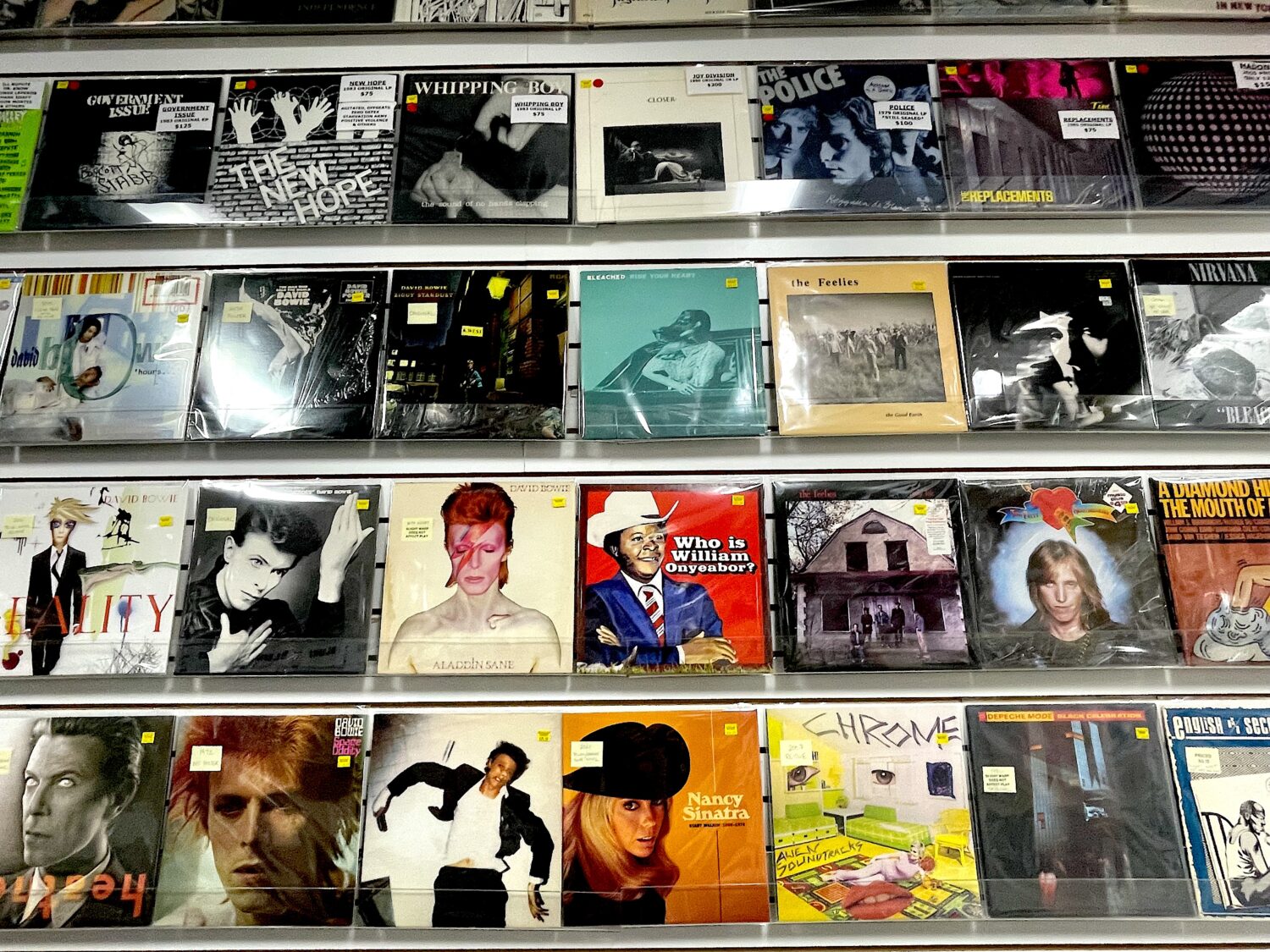
Rare records at Rockaway (Lina Lecaro)
LA Weekly had a couple of exclusive chats with Rockaway’s owner Wayne Johnson recently – about the record market, online buyers, the COVID effect, and past and the present trends of the business. The biggest revelation: far from struggling in the wake of streaming’s takeover of the music industry, his business has made more money in the past few years than it ever did before, including the vinyl and CD heydays.
For the most part, appreciation of physical albums encased in alluring cover art never went away, even as the compact cool of cassettes and the technological promise of CDs had their moments. Some of us even romanticize the 8 Track tapes our parents played, though we ultimately discarded them all for the simplicity of today’s digital music. Vinyl records, however, never really went away. Most of us held on to them or re-purchased what we regretfully got rid of. In general, records have been selling, and selling well, for nearly two decades now.
Just last year, an RIAA survey reported that vinyl record sales actually outperformed CDs in the U.S. for the first time since 1987. Just over 41 million vinyl records were sold in 2022 ($1.2 billion in sales) compared to only 33 million CDs ($483 million). Long gone are the days of flipping through rows of used CDs for hours at sceney stores like Aron’s Records or Amoeba. When Amoeba Hollywood (opened in 2001) moved to its current locale in 2021, it downsized CD stock substantially, as did Rockaway and most still-standing record shops in L.A. No one seems to be missing them, either.
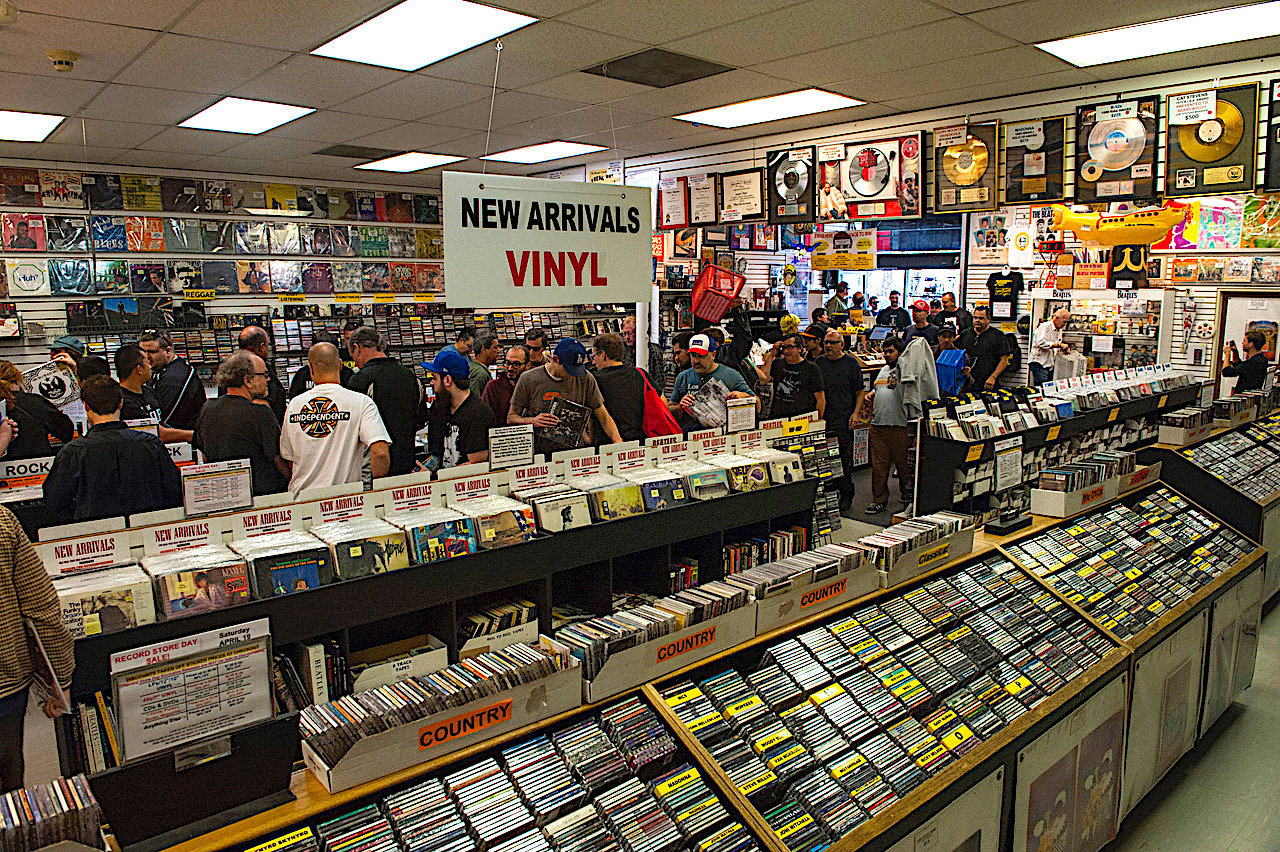
Rockaway back in the day (Courtesy Wayne Johnson)
Movin’ and Groovin’
After getting into the business via the famous Capitol Records record swaps, brother Wayne and Gary Johnson opened the original Rockaway (inspired by the Ramones classic “Rockaway Beach”) in a mini mall on Glendale Boulevard, now occupied by Silver Lake’s Whole Foods Market.
It was only blocks from our nana’s house in Silver Lake/Frogtown and we have many fond memories of visiting as a kid, rolling up on bikes with our cousins on sweaty summer afternoons, chatting with the punky employees and ogling all the sexy album covers, rock posters and promo, even when we didn’t have money to buy anything, which was most of the time. We’d leave with copies of the LA Weekly, BAM magazine and flyers for shows we’d never attend, all of which represented the music-centric world we longed to be a part of one day.
Rockaway moved along the street a few times in the ‘80s, including the old Mixer bar space (now housing Vietnamese food fave Gingergrass), before settling into its current location across the street (formerly the nightclub Cache) in 1992. “The business grew so fast because everyone was buying CDs like crazy then,” Johnson says during our chat at the current space. “People would trade in their vinyl to buy CDs, and then we’d sell the records. Business was just booming and we outgrew each space. Then this building, which was an old nightclub that went bankrupt, became available and we bought it.”
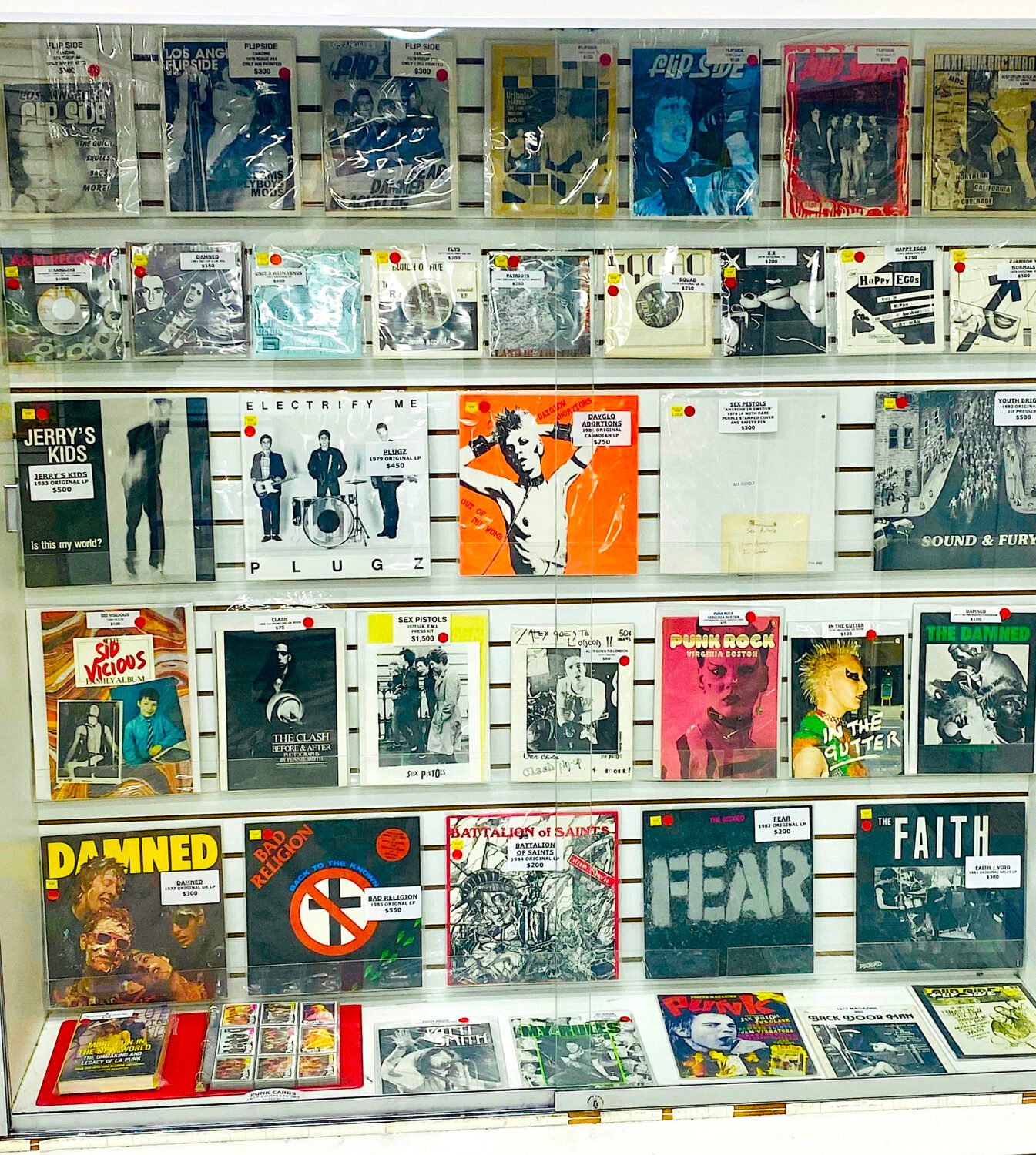
Rockaway’s recently acquired punk rock rarities (Lina Lecaro)
Wayne and Gary’s purchase of the 9,000-square-foot property made it the largest record store in L.A., at the time. These days, the actual store is much smaller, as they rent out most of the building to a Yoga studio and computer repair shop. The biggest change over the years came recently, just after the COVID shutdowns. Like many stores, they shifted business to mostly online and realized they really didn’t need to be open like a traditional store at all, even once other things opened up.
Whether due to everyone being homebound, or a need to reconnect with our pasts, the pandemic made for a boost not only in vinyl sales, but collectables in general. Rockaway was doing well enough to get rid of the employee overhead and transitioned into an appointment-only showroom full time, something Johnson says, “we should have done years ago.”
The brick-and-mortar is just one component of the Johnsons’ work, as they sell quite a bit on Discogs and Ebay, and they are known for paying top dollar and consistently unearthing vintage finds for discerning collectors. “Nobody pays as much as we do on the rare stuff,” Johnson assures. “Last year I paid $100,000 for one Beatles record.” He had a buyer lined up, of course.
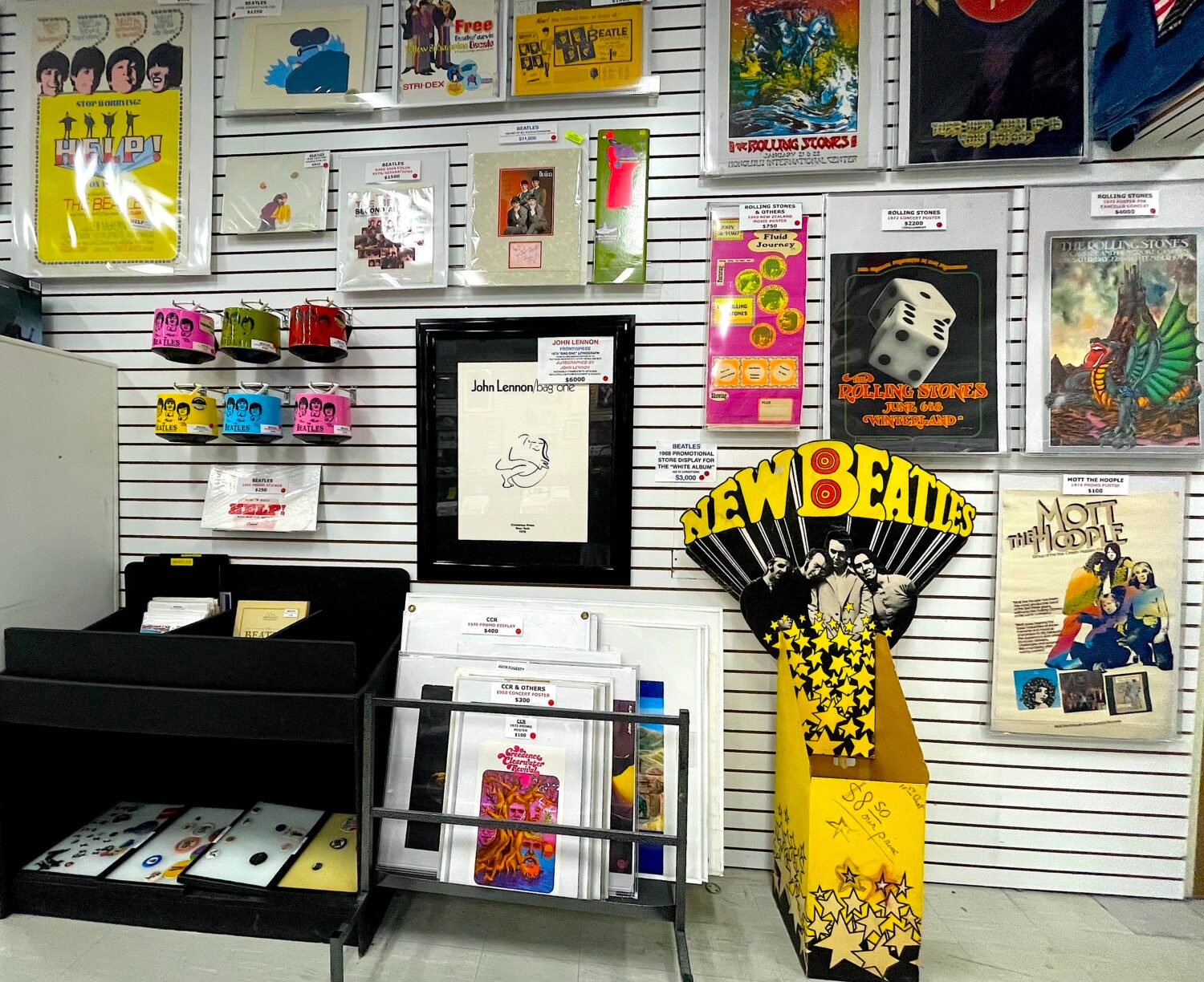
Collectables for everyone (Lina Lecaro)
“One time, a few years back, this kid walked in, like probably 12 years old, with a stack of records that he was selling at a yard sale – they had 25-cent price stickers on ‘em and he couldn’t get rid of them for that,” Johnson recalls. “We gave him $100 for one record and he almost fainted. He couldn’t believe it. But we paid $100 because it was worth almost $200 and we knew we could sell it.”
When a collector pal begrudgingly agreed to sell Johnson some of his stuff to pay a $5,000 tax bill, he suggested bringing a truck for the haul. But Johnson left with just five records as he gave him the five grand. “Even he didn’t know the value of what he had,” the music expert tells us.
Wayne dubs his brother Gary the preeminent authority on vinyl and its various values “in the world,” and the brothers’ large network, both in L.A. and around the globe via their website and online selling spaces, mean they serve as conduits for collectors and sellers alike. They’ve become, arguably, the biggest, best and most reliably fair people to buy from and sell to anywhere. You don’t have to be rich to shop here (there are albums in the $20-$30 range so it’s accessible to all), but big spenders and private shoppers who know what they want and are willing to pay for it are Rockaway’s bread and butter right now. Musicians such as Led Zeppelin’s Jimmy Page and The Black Crowes’ Chris Robinson both recently popped in for sprees and people travel from out of town to see what’s new regularly.
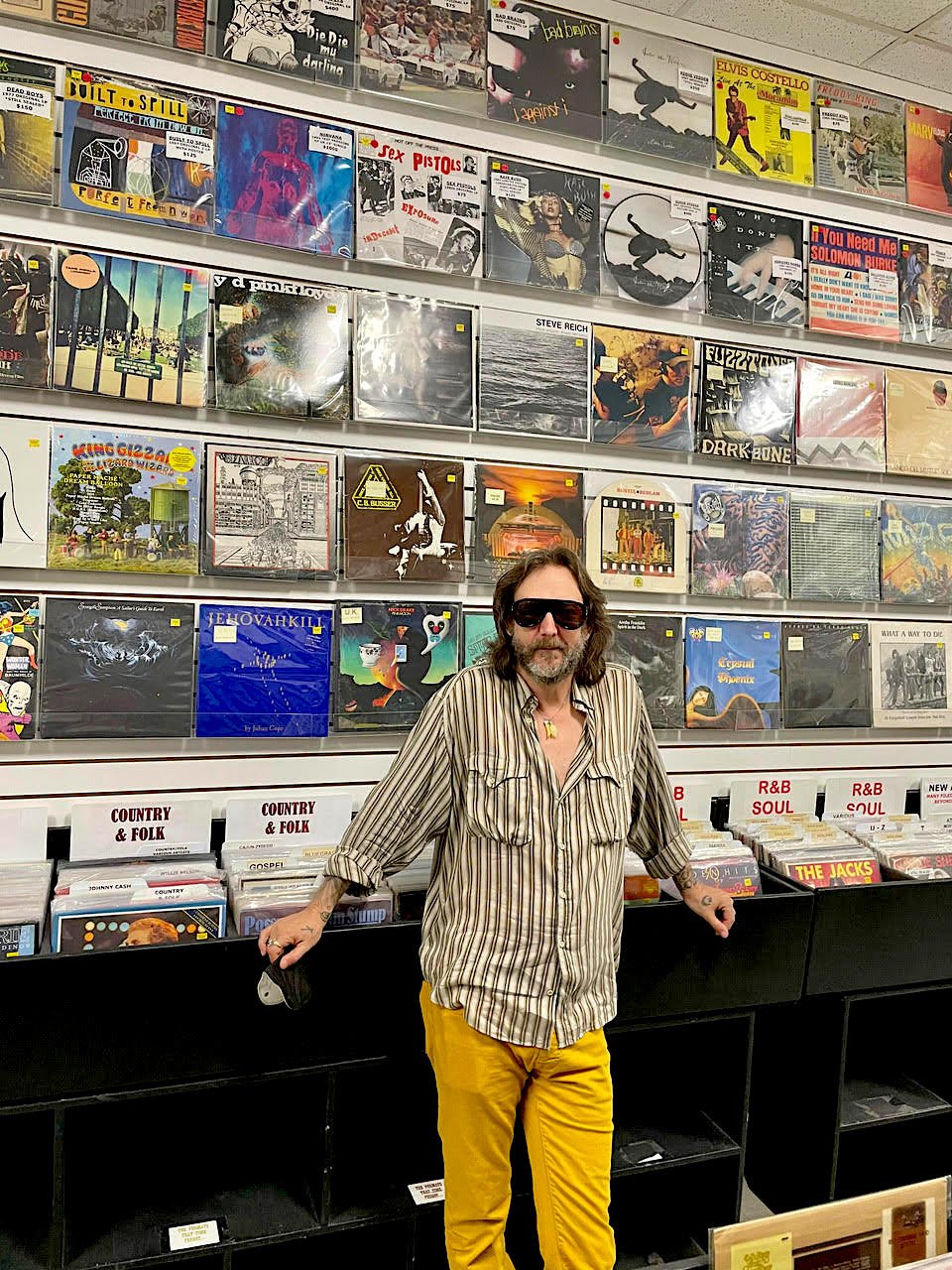
Chris Robinson pays a visit (Courtesy Rockaway Records)
Johnson often refers would-be sellers with lower ticket items to other shops, like nearby fave Record Safari. As we covered last year for Record Store Day, Safari’s buyer Alex Rodriguez also has noticed the record rage, both pre- and post-pandemic. As he told us then, “During the lockdown, I think people were looking for things to do in their home… the only thing that was actually open was retail, places like record stores — every time you go, there’s always different things to look at. Whether it’s comics or toys or records or antiques– collecting gave people something to do. I thought that the crazy sales and the resurgence was going to take a huge drop once people could travel again and go out, but it hasn’t.”
Spinning Gold
While CDs are pretty much dead in the dust, vinyl love is indeed lasting longer than anyone anticipated. Even Johnson admits he’s surprised at the viability. “I mean, when it started, it seemed over-hyped,” he says. “But then, every year, it’s like, flying out of the store and I’m seeing 20 year olds buying it, still. I’m happy I was wrong. With all these new releases being hot in the format, it keeps the old vinyl market alive, too. I think it’s always going to be collectable now.”
From vinyl to concert posters, T-shirts and clothing to promotional items and autographed merchandise, Rockaway continues to corner both sides (as in A and B) of the market, with genres like metal, punk and grunge becoming just as popular as classic rock lately.
Johnson recently paid $100,000 for a collection of Pearl Jam posters and memorabilia and he’s already moved most of it. He also just bought an astounding collection of punk singles and ephemera, which is prominently displayed in the store right now. He cites ‘90s rock as hot with collectors currently – bands like Nirvana, Soundgarden, etc. The Beatles are still popular and he paid $200,000 for a collection that includes an actual piece of the set from their Ed Sullivan Show appearance (signed by all four Beatles). Of course, Rockaway isn’t the only record store to maintain success in the streaming era. Against all odds, many in L.A. and across the country are not only surviving but thriving by thinking outside of the box(set). After the downsize and move to its current location, Amoeba seems to be doing well stocking gift items like T-shirts, coffee mugs and books. Lines spiraled throughout the store on Christmas last year.
Another favorite, Sick City Records, has a barber shop and clothing store inside its Echo Park mini-mall space. Permanent Records hosts live music, including regular sets from big names like Fred Armisen. And Safari is keeping vinyl cool with the kiddies via off-site commerce at festivals like Coachella and Cruel World.
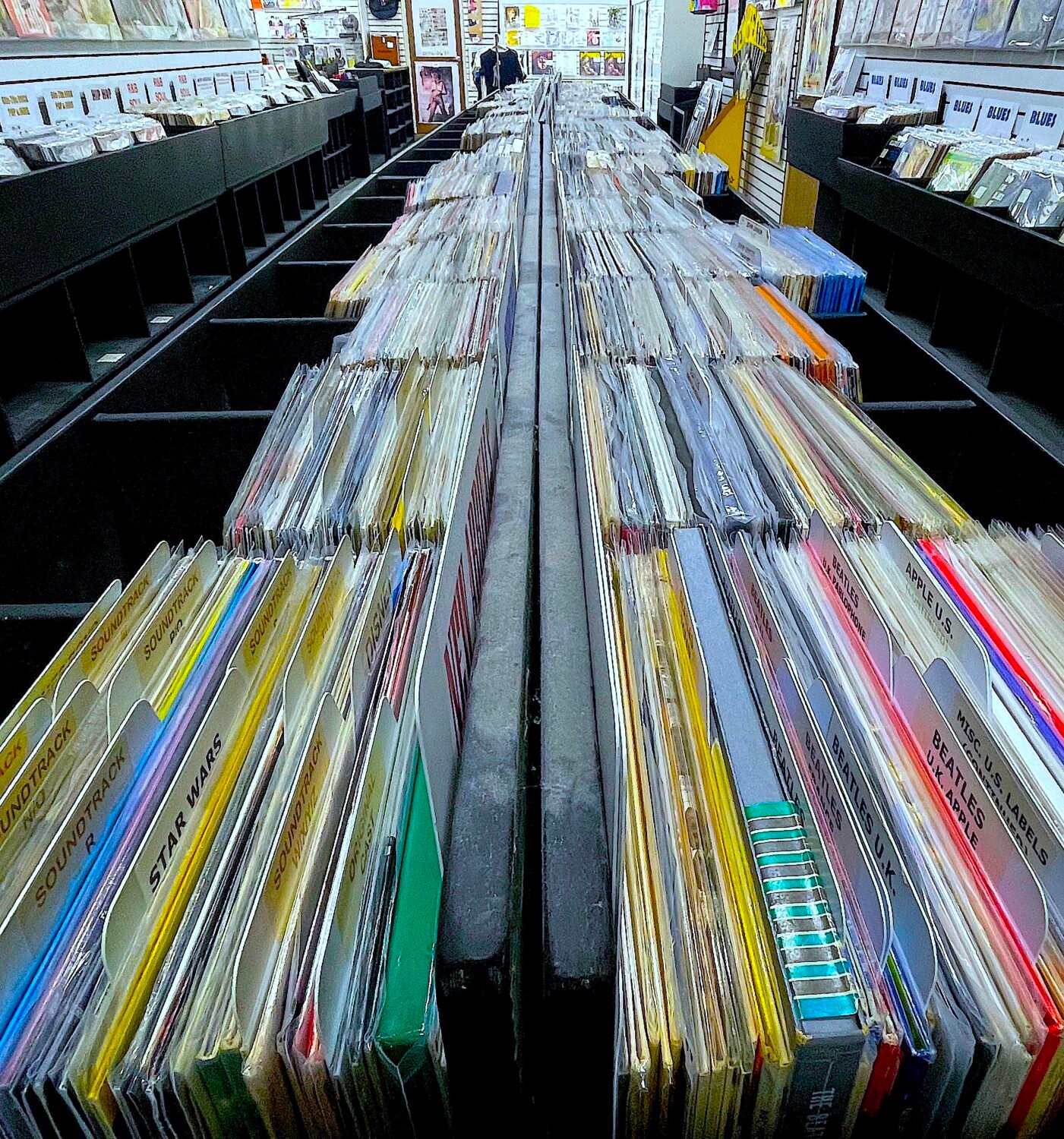
Mint music (Lina Lecaro)
L.A. record shops may not be what they once were and we’ll probably never recapture the magic of discovery that they provided when we were young. Shout out to legendary places that shaped us, though: Vinyl Fetish (closed), Rene’s (closed) and Headline Records (still open) on Melrose; Aron’s (which started on Melrose and moved to Highland Ave. before closing); Licorice Pizza (which was revived after the PT Anderson film came out, albeit in a very different form, on Ventura Boulevard); and Poobah’s in Pasadena, which is alive and well. [See list of our current favorite record shops below.]
“Spotify and Apple Music don’t affect the market at all,” asserts Johnson about the current music sales climate. “There’s enough people out there that still want the very first pressing of a record. It ain’t that easy to find first pressings that are mint, and there’s a big difference between used records and mint records.”
For all the rare vintage music and artifacts at Rockaway, Johnson cites new collectors as the biggest reason the business is likely to keep rocking. “People that bought all the regular stuff by their favorite artist seemed to have learned that there’s a whole bunch more to buy. And they became addicted,” he shares. “The demand hasn’t gone away, which has helped businesses hang on. Streaming is here to stay, too, but for the kind of big stuff we’re dealing with now, it’s irrelevant.”
Rockaway Records, 2395 Glendale Blvd., Silver Lake. Open for buying and selling by appointment only. 323-664-3232. More info at rockaway.com.
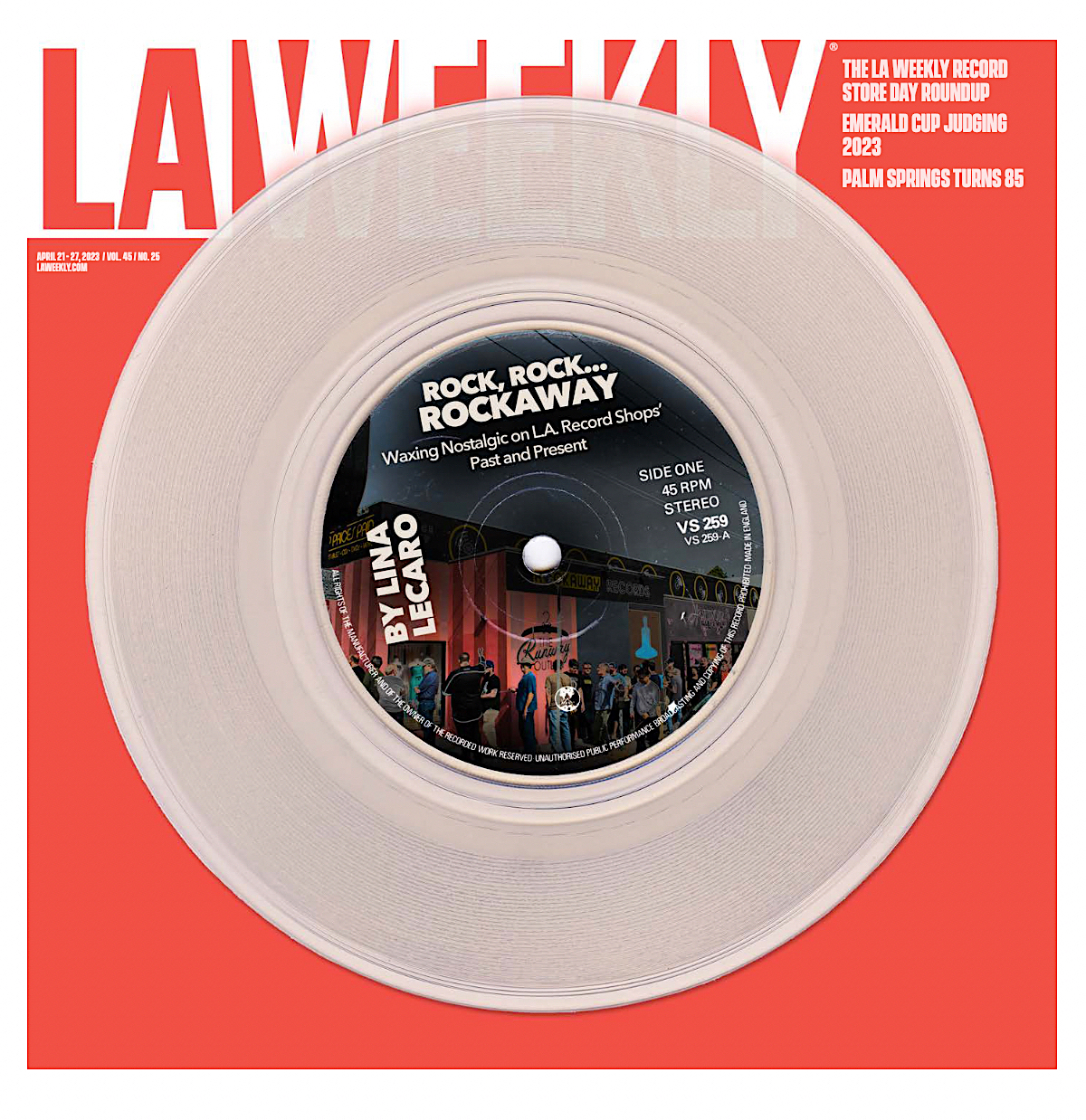
This week’s cover story.
Still Spinning
Check out these L.A. Record Shops this Record Store Day (4/22) or Anytime
AMOEBA HOLLYWOOD
6200 Hollywood Blvd, Hollywood. (323) 245-6400. amoeba.com
ARROYO RECORDS
5123 1/2 York Blvd. Highland Park. (909) 374-4730. facebook.com/arroyorecordslosangeles
ATOMIC RECORDS
3812 W Magnolia Blvd, Burbank. (818) 848-7090. atomicrecordsla.com
COSMIC VINYL
2149 Sunset Blvd, Silver Lake. (213) 568-3113. cosmicvinyl.com
FREAKBEAT RECORDS
13616 Ventura Blvd, Sherman Oaks. (818) 995-7603. freakbeatrecords.com
GIMME GIMME RECORDS
5810 N. Figueroa St, Los Angeles. (323) 550-1878. gimmegimmerecords.com
GOING UNDERGROUND RECORDS
356 1/2 E. 2nd St. Los Angeles. (323) 741-0200. goingundergroundrecords.com
JACKNIFE RECORDS & TAPES
3149 Glendale Blvd. Atwater. (323) 661-4533. jackniferecordsandtapes.com
LICORICE PIZZA
12230 Ventura Blvd, Studio City. (310 )887-1140. licoricepizzarecords.com
PERMANENT RECORDS
1906 Cypress Ave, Los Angeles. (323) 332-2312. permanentrecordsla.com
POO-BAH RECORD SHOP
2636 E Colorado Blvd, Pasadena. (626) 449-3359. poobah.com
MOUNT ANALOG
2217 Hyperion Ave., Silver Lake (917) 723-6075. climbmountanalog.com
RECORD SAFARI
3222 Los Feliz Blvd, Los Felix. (323) 928-2290. recordsafarilosangeles.bigcartel.com/
RECORD SURPLUS
12436 Santa Monica Blvd, Sawtelle. (310) 979-4577. recordsurplusla.com
THE RECORD PARLOUR
6408 Selma Ave, Hollywood. (323) 464-7757. facebook.com/therecordparlour
RUBYCON RECORDS AND TAPES
4850 Santa Monica Blvd Los Angeles. (832) 423-8469. rubyconrecords.com
SICK CITY RECORDS
1381 Sunset Blvd. Echo Park (323) 668-2088. facebook.com/SickCityRecords/
Editor’s note: The disclaimer below refers to advertising posts and does not apply to this or any other editorial stories. LA Weekly editorial does not and will not sell content.
Advertising disclosure: We may receive compensation for some of the links in our stories. Thank you for supporting LA Weekly and our advertisers.

